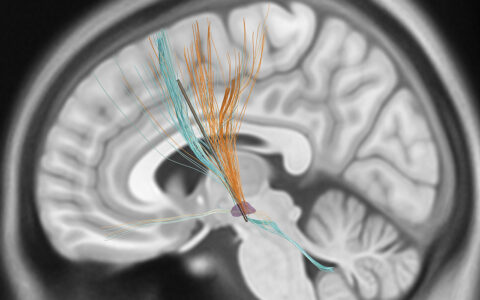Neurological surgeon and spine specialist Richard A. Berkman, M.D., can’t remember the last time he prescribed opioids for his elective surgical patients. He and Amanda Wright, M.P.A.S., a physician assistant in neurological surgery at Vanderbilt University Medical Center, have a 16-year track record of working together to improve the perioperative experience for their patients.
Berkman is a crusader against opioids for reasons beyond addiction risks. His message is that chronic opioid use has a deleterious effect on multiple organ systems and creates a cascade of health consequences.
“We demonstrated that our patients had either a comparable or superior experience without opioids.”
He aims to help more providers become acutely aware of these dangers, adjust their own protocols accordingly, and educate their patients by sharing this message to groups within Vanderbilt and other medical centers in Tennessee and Kentucky. Scores of physicians, physician assistants and nurse practitioners are “Zooming in” to hear his lecture.
Lessons from Surgical Outcomes
Berkman researched the literature on the various deleterious effects of opioids on multiple organ systems and the suitable alternatives to develop a program with Wright for a sustainable, opioid-free perioperative experience.
What they found and confirmed in their 2020 publication in The Spine Journal – one of the first studies to examine the complete elimination of opioids in spine surgery – was that non-opioids work just as well as opioids in treating postoperative pain following elective surgery.
“We demonstrated that our patients had either a comparable or superior experience without opioids: one-day hospital stays, low readmission rates, and high overall patient satisfaction,” Berkman said.
Berkman sees a cascade of negative consequences when a patient starts on the path of opioid use after surgery, citing statistics showing that even a 10-day regimen of opioids could lead to significant chance of long-term use.
Wright noted improvements since taking a different approach.
“Since 2018, when we instituted this protocol, nearly 90 percent of our patients used no opioids in the postoperative period and 100 percent of our patients were opioid-free by their 30-day postoperative visit.”
The Vicious Cycle of Fracture
Due to the ubiquitous nature of the mu opioid receptor, there are many other complications of long-term opioid use.
“One of the most common systemic effects of opioids is osteoporosis and fracture risk,” Berkman said. “Opioids bind to the mu opioid receptor site on human mesenchymal stem cells, inhibiting their proliferation and differentiation into osteoblasts. This contributes to the development of osteoporosis and poor bone healing.”
“In addition,” he said, “opioids bind to receptors in the hypothalamus, where they block gonadotropin-releasing hormone, resulting in a condition called Opioid-Induced Androgen Deficiency (OPIAD), another factor in osteoporosis.”
Opioids also cause a heightened sensitivity to pain. This hyperalgesia drives a vicious cycle. “These patients have a greater need for pain relief, so they take more opioids,” Berkman said.
“The downward spiral continues if they develop osteoporosis and have a fracture. They experience more pain from the fracture than non-opioid users, so they request increasingly higher doses of opioids,” Wright said.
Other Health Risks Heightened
Beyond osteoporosis, OPIAD is associated with estrogen and progesterone deficiencies in women, and testosterone deficiency in men, causing lethargy, depression, decreased sexual libido, and osteoporosis.
Chronic opioid use may also cause cancers to behave more aggressively. Studies show associations with shorter survival and more rapid time to tumor development in lung, renal, prostate, breast and gastrointestinal cancers. Conversely, discontinuing opioids, or blocking the peripheral mu opioid receptor with methylnaltrexone, is associated with increased survival.
Additionally, opioid use is associated with higher risk of infection, chronic constipation and slower healing.
Taking it to the Streets
Berkman says these systemic risks are still only vaguely understood by the medical community at large.
“I recently took a required course on opioids, and while more cautious prescribing was recommended, the implication was still that opioids were a necessary part of surgeries,” he said. “The whole rationale for this caution revolved solely around the danger of addiction.”
Berkman wants doctors and other providers to understand the evidence on the widespread perils of chronic opioid use.
“The first big message of my talks is that we now know that non-opioid analgesics provide equivalent pain relief to opioids for both acute and chronic pain management,” he said. “The second is that the systemic risks from opioid use are varied and serious. Why wouldn’t we do all we can to improve our patients’ odds of feeling and doing better over the long run by dropping opioids from our protocols?”






